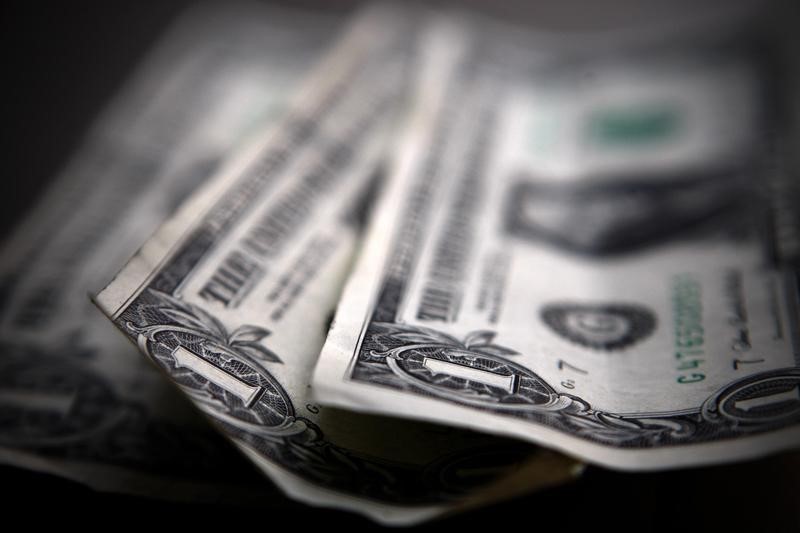How are energy investors positioned?
* Dollar index steady after slide
* Yuan kiwi hold gains but worry halts rise
* Aussie a tad lower as Melbourne faces lockdown
* Graphic: World FX rates in 2020 https://tmsnrt.rs/2RBWI5E
By Tom Westbrook
SINGAPORE, July 7 (Reuters) - The dollar found some traction
on Tuesday, as risks from rising coronavirus cases offset strong
economic data and kept a lid on confidence in an economic
recovery from the COVID-19 pandemic.
Following a Monday slide, the greenback was steady on most
majors and clung on near a two-week low against a basket of
currencies USD= .DXY , tracking the mood in equity markets.
The Australian dollar AUD=D3 pulled back from a one-month
high after the country's second-most populous state announced
six weeks of stay-at-home restrictions and a lockdown for the
city of Melbourne to curb rising cases. The Aussie was unmoved after Australia's central bank held
the country's benchmark interest rate at a record low 0.25%, as
expected, and said it would maintain its accommodative approach
for as long as required. The Chinese yuan CNH= picked up where it left off after
soaring with runaway Chinese equities on Monday, but pulled back
from an offshore top of 6.9965 per dollar as caution crept in.
Investors are watching nervously as infections surge in the
United States and India, but are so far taking the view that
more massive lockdowns are unlikely.
The daily case count makes grave reading, but deaths have
not jumped, said Chris Weston, head of research at Melbourne
brokerage Pepperstone, who is more closely watching the bond
market where stubbornly low yields are driving cash elsewhere.
The yield on benchmark 10-year U.S. Treasuries US10YT=RR
has been parked at roughly 0.7% for a month, well below an early
June top of 0.9590% and more than 100 basis points below where
they began the year. US/
"If we were to suddenly see signs of a sell-off in the
Treasury market, that could have big implications for where
global capital sits. Until that point, it's onwards and
upwards," Weston said. "Just do what's working and carry on
buying."
Since April, that has been commodity currencies led among
the G10 by the Aussie. It has gained 14%, the Norwegian krone
NOK= 11%, the kiwi NZD=D3 10% and the Swedish krona 8%.
On Tuesday, the kiwi last sat steady at $0.6554 having, like
the Aussie, pulled back from testing the top of a range it has
kept for about a month. AUD/
The euro EUR= sat just below a two-week high touched on
Monday at $1.1311 and the pound GBP= held steady at $1.2505.
The yen JPY= was flat at 107.36 per dollar.
"The worst is likely over, but a swift and steady recovery
cannot be taken as the base case," said Terence Wu, a strategist
at Singapore's OCBC Bank, in an outlook note expecting dollar
weakness to persist, but with risks if lockdowns resumed.
HEALTHY BULLS
Monday's surge in sentiment came after a front-page
editorial in the China Securities Journal, affiliated with
state-run Xinhua, said fundamentals laid the foundation for a
"healthy bull market". Data also showed U.S. service industry activity rebounded to
almost pre-pandemic levels last month, with the headline figure
of 57.1 well ahead of expectations around 50.2. Markets are looking for a rebound in German industrial
output data due at 0600 GMT and expect a slight dip in U.S. job
openings at 1400 GMT in the latest economic updates.
Meanwhile, the rapid spread of the coronavirus has given
some pause for thought.
Florida's greater Miami area became the latest hot spot to
roll back its reopening as virus cases surged nationwide by the
tens of thousands and the U.S. death toll topped 130,000.
Australia will shut the border between its two most populous
states at one minute before midnight on Tuesday, as it attempts
to contain an outbreak in the city of Melbourne. "The dollar index is firmly ensconced in a 96-98 range,"
National Australia Bank analysts said in a note. "It will need a
major shift in risk sentiment one way or the other to see either
edge tested."
(Editing by Shri Navaratnam and Jacqueline Wong)
